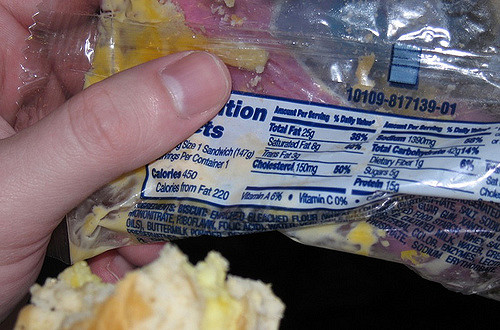Though they are not as big of an issue as they have been in years past, trans fats are still found in many foods and large amounts of Americans consume them. Lots of people have heard that trans fats are bad, but are offered no explanation about why or how they negatively affect you if included in your diet. Most people don’t even know what foods trans fats are found in and what are healthy alternatives to these foods.
What are they?
Two types of trans fats exist: naturally occurring and artificial. For now, I’ll focus on artificial trans fats. Artificial trans fats are created through an industrial process where hydrogen is added to liquid vegetable oils in order to make them last longer and improve the taste of foods. You can check for artificial trans fats on food labels for anything labeled as hydrogenated or partially hydrogenated oils and also the listed amounts of trans fats found in that food, though it’s important to remember that the information may not be accurate, so there are some foods to completely avoid or limit your consumption of them. Some countries and cities (such as Canada, Denmark, Baltimore, California, and NYC) have restricted the amount of trans fats that can be in the food sold in those areas. The FDA has even stated that manufacturers must stop using trans fats in foods by 2018.
How are they harmful?
Trans fats can clog arteries and greatly increase your levels of bad (LDL) cholesterol while lowering your good (HDL) cholesterol. Consuming an excessive amount of trans fats greatly increases your risk for heart disease, a stroke, and even diabetes. Some people also suspect that trans fats cause inflammation, which leads to many modern health issues in the United States.
What are naturally occurring trans fats?
Naturally occurring trans fats have always been present and are found in meat and dairy from certain animals, such as cattle, sheep, and goats. These trans fats are created from bacteria in the animals’ stomachs to assist in digestion. No extensive studies have been done on the effects of these natural trans fats, but current information shows that there do not seem to be the same negative side effects in consuming naturally occurring trans fats as there are in eating artificial trans fats, though naturally occurring trans fats should still be consumed in moderation.
What foods to avoid
While you can check food labels and try to stay on top of monitoring what foods are marked with trans fats, there are also general types of foods that frequently contain trans fats and should be avoided or consumed in moderation. Here’s the list: baked goods, such as pies, cookies, biscuits, etc., microwave popcorn, doughnuts, fried fast foods (these contain huge amounts of trans fats, though you can easily check nutritional information), frozen pizza, and stick margarine. Here’s an even more comprehensive list.

